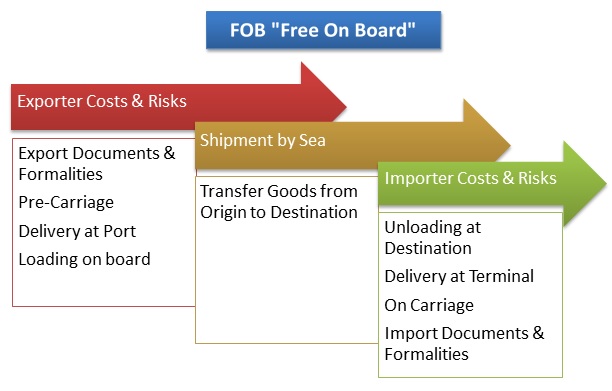FOB (Free On Board) - Definition, Importance & Steps
What is FOB (Free On Board)?
Free on Board (FOB), also referred as Freight on Board, refers to the rights and obligations of parties involved in shipping or transferring goods on a vessel. Specifically, FOB tells the information on the buyer and seller and info on the party paying the system. It also specifies the party responsible and liable for the product under shipping.
Importance of FOB (Free On Board)
Many shipping of good terms are used initiated by FOB. It is mostly used in USA, as a liability of goods. If used with word origin it means the specification of the party responsible for loading and transportation. Usually it is the buyer who pays the shipping cost and held responsible for the goods shipped from the shipper. There are two types of FOB i.e. FOB Origin and FOB Destination. It usually deals with the following important issues:
1. Which party – buyer or seller – pays for the shipment and loading
2. At what point the goods are considered transferred from the buyer to the seller
3. At what point the transfer of risk takes place
4. When and how the payment is made
5. Liability for damaged goods during transit
6. Licenses, authorizations, insurance
Steps in Managing FOB (Free On Board)

Managing FOB has the following steps:
1. Exporter Costs & Risks
a. Export Documents & Formalities
b. Pre-Carriage
c. Delivery at Port
d. Loading on board
2. Shipment by Sea
a. Transfer Goods from Origin to Destination
3. Importer Costs & Risks
b. Unloading at Destination
c. Delivery at Terminal
d. On Carriage
e. Import Documents & Formalities
Hence, this concludes the definition of FOB (Free On Board) along with its overview.
This article has been researched & authored by the Business Concepts Team. It has been reviewed & published by the MBA Skool Team. The content on MBA Skool has been created for educational & academic purpose only.
Browse the definition and meaning of more similar terms. The Management Dictionary covers over 1800 business concepts from 5 categories.
Continue Reading:
What is MBA Skool?About Us
MBA Skool is a Knowledge Resource for Management Students, Aspirants & Professionals.
Business Courses
Quizzes & Skills
Quizzes test your expertise in business and Skill tests evaluate your management traits
Related Content
All Business Sections
Write for Us